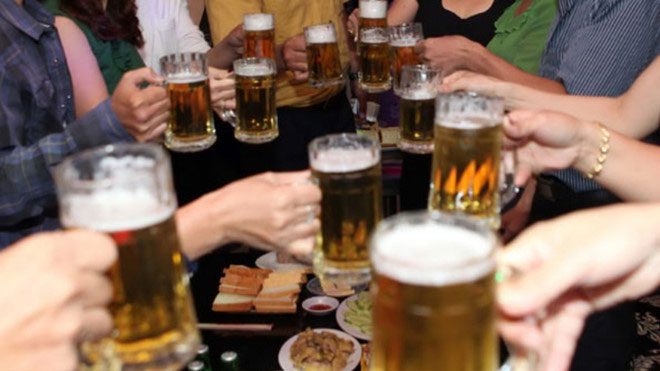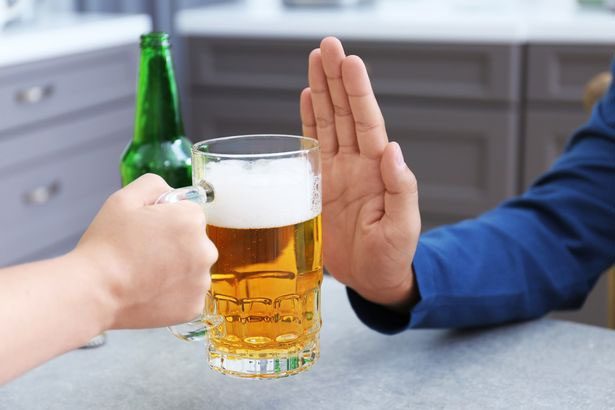During the final days of the old year and the beginning of the new year, alcohol is unavoidable. However, excessive consumption of alcoholic beverages can lead to a loss of behavioral control, accidents, and long-term health issues.
How to Drink Alcohol Safely During Tet
Below are 8 principles you should follow when consuming alcohol, particularly during Tet, to ensure safety for yourself and those around you.
1. Know Your Limits and Set a Stopping Point
According to the Australian Department of Health, consuming alcohol in moderation is part of a healthy lifestyle, as long as you understand its effects on your body. The Department recommends that healthy adults should not drink more than 10 standard drinks per week, and no more than 4 standard drinks in a single day to reduce the risk of lifelong health issues related to alcohol consumption.
Each standard drink contains 10g of pure alcohol, which is equivalent to 260ml of beer with an alcohol content of 4.8%. This is the amount of alcohol that the human body can process in one hour. The total amount of alcohol you can consume depends on your age, weight, gender, and mental state.

If you don’t eat anything before drinking, alcohol will enter your bloodstream faster.
Drinking beyond your body’s limits can lead to accidents or injuries due to intoxication. Regularly consuming excessive alcohol also increases the risk of chronic diseases such as heart disease, cancer, liver failure, brain damage, and mental health issues.
2. Eat Before and While Drinking
Alcohol is absorbed by the stomach and small intestine before entering the bloodstream. If you do not eat anything before drinking, alcohol will enter your bloodstream more quickly.
Therefore, you should eat before and even while drinking. Some tips to keep in mind include:
- Drink plenty of water.
- Avoid mixing alcohol with sugary drinks or energy drinks.
- Steer clear of salty foods as they will make you thirstier and lead to increased consumption.
Individuals who are weak, malnourished, women, and those with heart, kidney, or respiratory diseases should refrain from consuming alcohol. If you must drink, do so minimally and only after eating.
Do not attempt to infuse alcohol if you are unsure of the ingredients.
If you experience symptoms such as headaches, stomach pain, dizziness, low body temperature, low blood pressure, or blurred vision after drinking, seek medical assistance immediately.
3. Control Your Quantity
Associate Professor Dr. Nguyễn Quang Dũng, Deputy Head of the Department of Nutrition and Food Safety at Hanoi Medical University, advises that men should not consume more than 720ml of beer, 300ml of wine, or 60ml of whiskey per day. For women, the limits are 360ml of beer, 150ml of wine, or 30ml of whiskey per day. Children and teenagers should not consume alcohol. Strive to keep your intake at the lowest risk level during each drinking occasion.
Avoid mixing alcohol with beer and other stimulants, as this can lead to acute intoxication, resulting in dizziness, nausea, bloating, constipation, or even loss of consciousness and death when blood alcohol levels are excessively high.
You can easily overindulge when drinking and consume more than you intend. A standard drink is roughly equivalent to one can/bottle of beer with an alcohol content of 3.8% (most beers on the market today have an alcohol content ranging from 4% to 5.5%), 100ml of light wine, or 30ml of strong spirits. Cocktails served in restaurants, bars, or clubs often have a higher alcohol content than a standard drink.
Set a personal limit and stick to it. Avoid “keeping up” with friends who may have a higher tolerance. Try to finish your drink before ordering another instead of “stacking cans” on the table.
4. Reduce Alcohol Intake with Non-Alcoholic Beverages
Your blood alcohol concentration will directly affect your body. The higher the concentration, the greater your risk of accidents.

The faster you drink, the higher your blood alcohol concentration.
Your body can only process 10g of alcohol per hour. In other words, within one hour, your body can manage less than one can of beer. The faster you drink, the higher your blood alcohol concentration.
To ensure safety, you should drink slowly and reduce your alcohol intake by:
- Consuming non-alcoholic beverages.
- Drinking water to reduce thirst before consuming alcohol.
- Choosing drinks with lower alcohol content.
- Sipping rather than chugging.
5. Avoid Drinking Games and Challenges
When you get caught up in the fun and start drinking, the risk of danger, injury, or even alcohol poisoning increases.
Try to steer clear of games and challenges that encourage participants to drink more and faster. Instead, engage in dancing, singing, or discussing a favorite movie or entertainment program.
Note that you should not mix alcohol with energy drinks, as this can create a deceptive sense of drinkability leading to higher consumption. Additionally, be particularly cautious when drinking while on medication or during treatment.
6. Do Not Drive After Drinking
Operating a vehicle with alcohol in your blood or breath is prohibited under the 2019 Law on Prevention of the Harms of Alcohol and Beer (effective from January 1, 2020). Additionally, Decree 100/2019/NĐ-CP sets forth penalties for violations of blood alcohol levels when driving, including fines of up to 40 million VND for cars and 8 million VND for motorbikes, along with additional punishments such as license suspension for up to 24 months and vehicle confiscation. Therefore, by law, you are not permitted to drive after consuming alcohol (if you still have alcohol in your blood or breath).
Moreover, there is no safe threshold for driving after consuming alcohol. The more you drink, the higher your risk of traffic accidents. When accidents occur, other vehicles on the road are affected as well, not just yourself.
Instead of driving after consuming alcoholic beverages, you can:
- Arrange your transportation home before starting the festivities.
- Designate a sober driver, ensuring they do not consume alcohol.
- Prepare cash or a bank card to use for taxis or ride-hailing services.
- Research public transportation routes (if available).
7. Say No If You…

It is best not to consume alcohol if you are under 18.
If you are underage, pregnant or planning to become pregnant, breastfeeding, taking medication, undergoing treatment, or feeling stressed or depressed.
In some cases, consuming alcohol can be very harmful. It is best not to consume alcohol if you are under 18. Furthermore, the 2019 Law on Prevention of the Harms of Alcohol and Beer also prohibits those under 18 from consuming alcohol.
If you are pregnant or breastfeeding, to ensure the health of your child, it is advisable not to consume alcohol.
Moreover, if you are taking medication, it is best to avoid alcohol, as mixing medication with alcohol can cause unwanted side effects. Additionally, avoid consuming alcohol when feeling stressed or depressed, as it may worsen your condition.
Drink alcohol safely and responsibly for yourself and the community.
8. Avoid Cold Environments After Drinking
Dr. Lê Hoàn from the Respiratory Internal Medicine Department at Hanoi Medical University states that when consuming alcohol, ethanol causes blood vessels in the skin to dilate, accompanied by a burning sensation in the throat, making you feel warmer. This sensation will quickly fade. In cold weather, alcohol consumers should keep warm.
Sudden exposure to cold environments after drinking can lead to hypothermia due to dilated blood vessels under the skin, resulting in increased heat loss. At this point, the drinker may feel drowsy and lose control, leading to rapid vasoconstriction and increased blood pressure. In severe cases, individuals with a history of hypertension or vascular disorders may suffer a stroke. Those with weak constitutions or compromised immune systems are also susceptible to respiratory diseases such as pneumonia and bronchitis.



















































